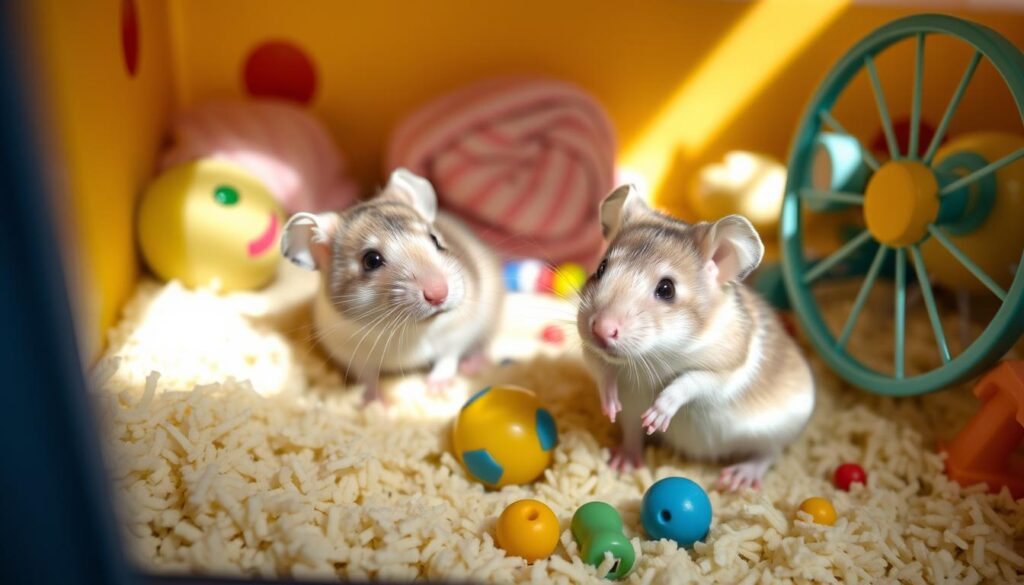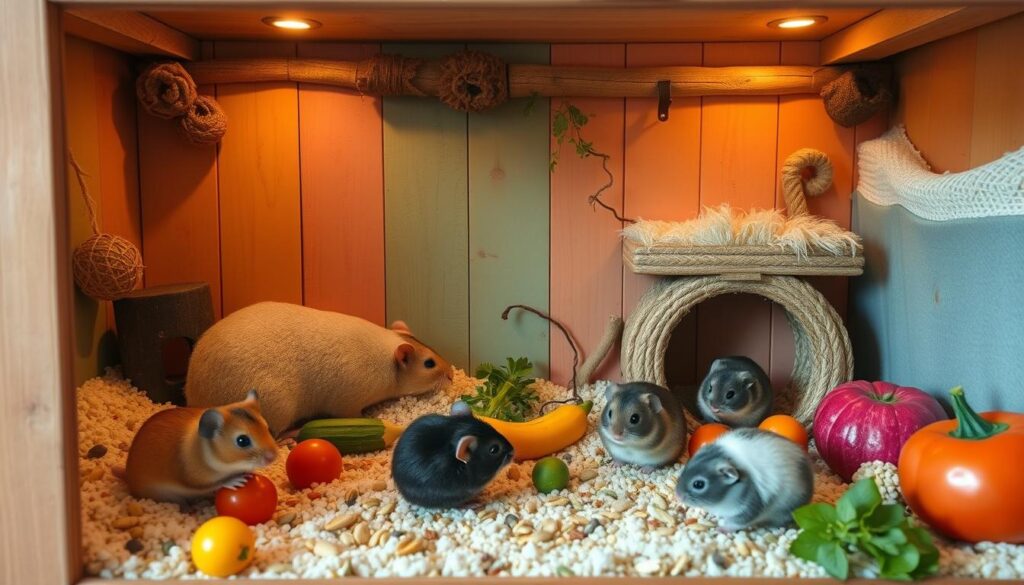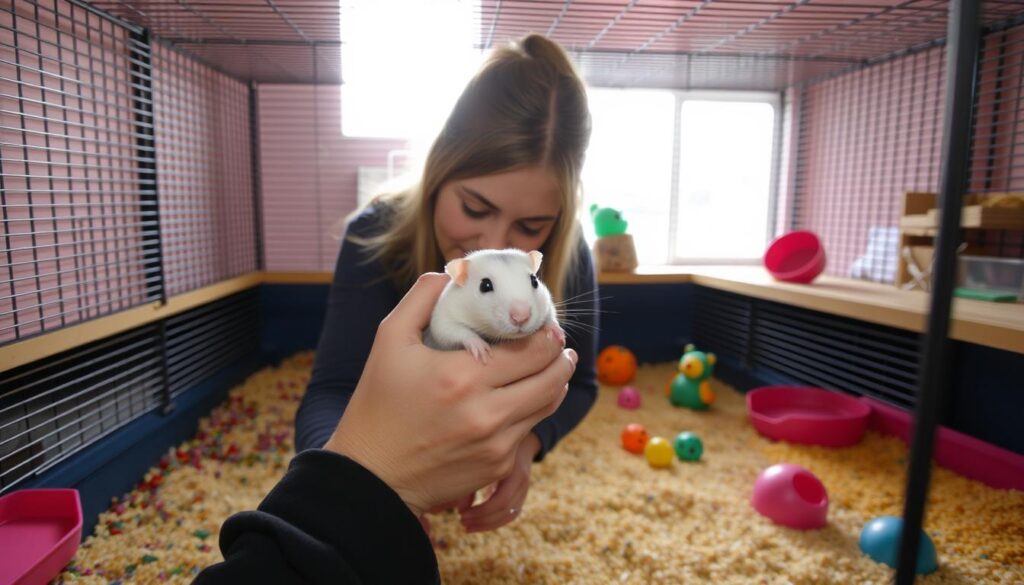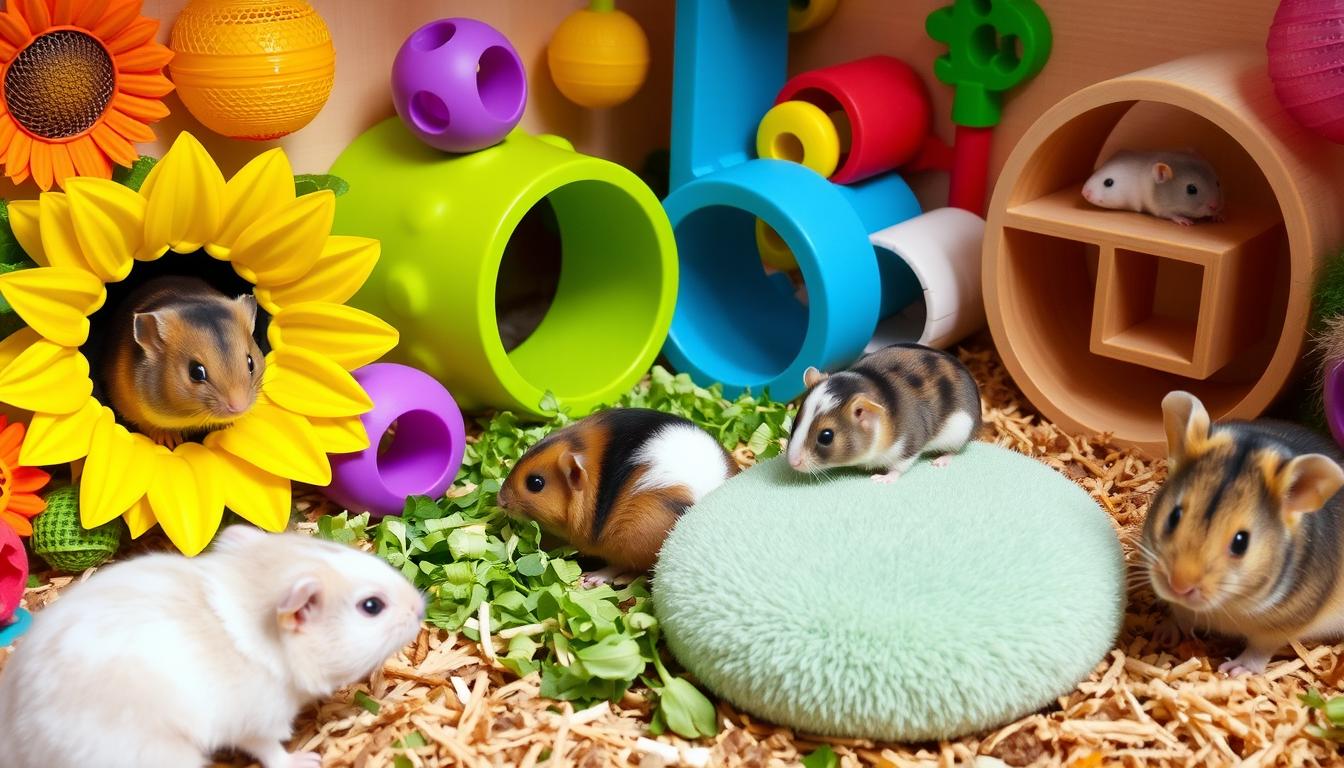Small rodents are becoming more popular as pets in the United States. They are cute, friendly, and easy to care for. This makes them a great choice for many people. If you’re thinking about getting a pet, you might wonder which small rodents are the best.
Hamsters, gerbils, and mice are top choices for beginners. They are easy to care for and can be great companions. These animals are perfect for those living in small spaces or with little time for pet care.
They are also great for families with kids. They can teach children about responsibility and compassion. With proper care, small rodents can become beloved family members.
Key Takeaways
- Small rodents make great pets for people with limited space or time
- Top rodents for beginners include hamsters, gerbils, and mice
- Best small rodents as pets are relatively low-maintenance and easy to care for
- They are a great choice for families with children
- Small rodents can thrive with the right care and attention
- They can become beloved members of the family
- Researching the best small rodents as pets can help you make an informed decision
Understanding Why Small Rodents Make Excellent Pets
Choosing the right pet rodent involves many factors. Comparing small pet rodents can be tough. But knowing the perks of having these tiny friends can simplify your choice. Their small size is a big plus, fitting well in small apartments or tight spaces.
Small rodents are easy to care for and fun to be around. They love to interact, making them great for those who enjoy a pet that keeps them company. Plus, they need little space and are not expensive to look after.
Benefits of Choosing Rodents as Pets
- Low maintenance
- Engaging personalities
- Compact size
- Relatively inexpensive to care for
It’s key to know how much time different rodents need. Some, like hamsters and gerbils, are active at night. Others, like rats and mice, are active during the day. Knowing this helps pick the right pet for your schedule.
Time Commitment Requirements
Choosing the right pet rodent means thinking about your lifestyle and how much time you can give. By understanding what small rodents need, you can pick the perfect pet for you.
Best Small Rodents as Pets: A Complete Species Guide
Choosing your first pet can be tough. When looking at best small rodent breeds, there are many good choices. Rodent species for first-time owners should be easy to care for, friendly, and not too demanding. Hamsters, gerbils, and mice are popular picks.
Here are some key characteristics of each species:
- Hamsters: known for their small size and cute appearance, hamsters are a popular choice for many owners.
- Gerbils: gerbils are social and active, making them a great choice for owners who want to interact with their pets.
- Mice: mice are intelligent and curious, and can be trained to do tricks and navigate mazes.
When picking a best small rodent breed, think about space, diet, and social needs. Rodent species for first-time owners should be easy to care for and handle. They should have a simple diet and social needs. By choosing wisely, you can have a happy and healthy pet.
| Species | Size | Lifespan | Diet |
|---|---|---|---|
| Hamsters | 5-7 inches | 1.5-3 years | Seed-based diet |
| Gerbils | 6-12 inches | 2-3 years | High-fiber diet |
| Mice | 6-10 inches | 1.5-2.5 years | High-protein diet |
Essential Factors to Consider Before Getting a Pet Rodent
Before getting a pet rodent, think about a few key things. Caring for pet rodents means knowing their needs. This includes space, money, and time.
For small rodent care tips, space is very important. Each rodent type needs different cage sizes and environments. Some like to be alone, while others enjoy being with friends.
Living Space Requirements
- Cage size: A minimum of 24 inches long, 12 inches wide, and 12 inches tall
- Environmental enrichment: Toys, tunnels, and climbing structures to stimulate physical and mental activity
- Social interaction: Some species require social interaction, such as handling and playtime outside of their cage
Financial Considerations
The cost to start with a pet rodent can be $50 to $200. This depends on the type, cage, and extras. Monthly costs for food, bedding, and vet visits can be $20 to $50.
| Expense | Initial Cost | Monthly Cost |
|---|---|---|
| Cage and accessories | $50 to $100 | $0 |
| Food and bedding | $20 to $50 | $10 to $20 |
| Veterinary care | $0 to $50 | $10 to $30 |
Time and Attention Needs
Each rodent type needs different amounts of time and attention. Some are easy to care for, needing just daily cleaning and food. Others need more, like regular play and social time.
Hamsters: The Classic Small Pet Choice
Hamsters are a top pick for many pet lovers. They are cute, friendly, and easy to care for. This makes them perfect for beginners. With different types like Syrian, Dwarf, and Roborovski, there’s a hamster for everyone.
Hamsters don’t need a lot of space. They’re happy in cages or small enclosures. This is great for those living in small places. They also don’t cost a lot to keep, with affordable food, bedding, and toys. For more pet care tips, check out pet care websites.
Here are some key characteristics of hamsters as pets:
- Nocturnal, so they sleep during the day and are active at night
- Solitary animals, so they prefer to live alone
- Low-maintenance, but still require regular care and attention
- Affectionate, but can be skittish if not handled gently and carefully
Hamsters are great pets for those wanting a low-maintenance but fun pet. Their cute looks, playful nature, and small space needs make them a favorite. Whether you’re new to pets or not, hamsters are a wonderful choice.
Gerbils: Social and Active Companions
Gerbils are popular pets known for being social and active. When picking a pet rodent, comparing different species is key. Gerbils are great for those who want a pet that’s interactive and loves people.
Choosing the right pet rodent means knowing what gerbils need. They love being around others and thrive in groups. Keeping them in pairs or groups is best for their happiness and health.
- Providing a large enough enclosure to accommodate their active nature
- Offering a variety of toys and activities to keep them stimulated
- Ensuring they have a balanced diet that meets their nutritional needs
Understanding gerbils’ needs and providing the right care leads to a happy pet. Gerbils are a wonderful choice for both new and experienced pet owners.
Mice as Pets: Tiny but Full of Personality
Mice are often overlooked as pets, but they can be wonderful for the right owner. They are popular pets for beginners because they are easy to care for. Their curious nature and small size make them a great addition to any home.
Keeping mice as pets is relatively easy. They like to be with others, so it’s best to keep them in pairs or groups. A well-ventilated cage with hiding places and toys is key to their happiness. They eat a mix of seeds, fruits, and vegetables.
Here are some pros and cons of keeping mice as pets:
- Low-maintenance care
- Affordable to keep
- Entertaining to watch
- Short lifespan (average 1-2 years)
- May be prone to health issues if not properly cared for

Mice can be great pets for those who care for them properly. They are perfect for beginners because they are easy to handle. Their small size and big personalities make them very lovable. If you’re thinking of getting a mouse, make sure you understand their needs.
| Mouse Breed | Lifespan | Temperament |
|---|---|---|
| Lab Mouse | 1-2 years | Curious, social |
| Pet Mouse | 1-2 years | Friendly, outgoing |
| Fancy Mouse | 1-2 years | Active, playful |
Pet Rats: Intelligent and Affectionate Companions
Pet rats are often overlooked, but they make great pets. They are smart, loving, and can bond strongly with their owners. So, caring for pet rodents like rats means giving them mental challenges and social time.
There are over 60 rat breeds, from Dumbo and Hooded to Rex and Hairless. You can find a rat that matches your preferences in coat color or personality. Whether you want a specific look or a unique character, there’s a rat for you.
Rat Breeds and Colors
- Dumbo rats: known for their large ears and gentle nature
- Hooded rats: recognized by their distinctive hood of color on their heads
- Rex rats: characterized by their curly or wavy coats
Pet rats are also very smart. They can learn tricks and commands with patience and practice. They can even learn to navigate mazes and recognize their name. This makes them fun to care for and interact with.
Training Capabilities
Pet rats love to interact and need lots of attention. They need regular handling and playtime outside their cages to stay happy. By giving them a stimulating environment and lots of social time, you can build a strong bond with your rat.
| Breed | Temperament | Color |
|---|---|---|
| Dumbo | Gentle | Black, White, Grey |
| Hooded | Curious | Black, White, Brown |
| Rex | Playful | Agouti, Black, Blue |
Creating the Perfect Habitat for Your Rodent
When it comes to small rodent care tips, creating a good home for your pet is key. You need to pick the right cage, bedding, and accessories. This ensures your rodent stays happy and healthy. For caring for pet rodents, a safe and comfy place is a must.
To start, think about these important things:
- Cage type and size: Pick a cage big enough for your rodent to play and move.
- Bedding options: Choose something safe and comfy, like wood shavings or recycled paper.
- Accessories: Add fun stuff like wheels, tunnels, and hiding spots to keep your rodent busy.
Keeping the right temperature and air flow is also key. Make sure your rodent’s cage has good air and is not too hot or cold. Clean the cage often to keep it free from germs and smells. By following these small rodent care tips, you can make a great home for your pet.
Remember, caring for pet rodents means paying close attention and caring deeply. With the right home and care, your rodent can live a long, joyful life.
Nutritional Requirements for Small Rodent Pets
Feeding your small rodent pet the right food is key to their health. A balanced diet helps avoid obesity and other health problems. Start with a good quality commercial food and add fresh fruits and veggies for extra nutrients.
Understanding your pet’s diet is crucial for caring for pet rodents. Each species has its own needs. Stick to a high-quality commercial food and add fresh foods in small amounts.
Basic Diet Guidelines
- Provide a high-quality commercial food as the main staple
- Supplement with fresh fruits and vegetables daily
- Limit treats to no more than 10% of daily calorie intake
Don’t overfeed to avoid obesity and health issues. Always have fresh water available. Clean food dishes often to stop bacteria growth. By following these small rodent care tips, your pet will stay happy and healthy.

Treats and Supplements
Treats can be fun for your pet rodent, but use them sparingly. Choose healthy treats like carrots, apples, or sweet potatoes. Avoid treats high in sugar or fat. Always check with a vet before adding new foods or supplements to your pet’s diet.
Health Care and Veterinary Needs
Caring for pet rodents means paying attention to their health. Regular vet visits are key to keeping them healthy. It’s important to find a vet who knows about rodents.
This vet can spot health problems early and teach you how to prevent them. Some common issues include breathing problems, tumors, and parasites. Watch for signs like changes in appetite or breathing trouble.
By staying alert and proactive, you can manage or prevent these issues. Preventative care measures like a balanced diet and a clean home are crucial. They help keep your pet in top shape.
Here are some small rodent care tips to remember:
- Provide fresh water and food daily
- Clean the cage regularly to prevent the buildup of bacteria and odors
- Monitor your pet’s behavior and watch for signs of illness
By following these tips and keeping up with your pet’s health, you can ensure a long, happy life.
Understanding Rodent Behavior and Body Language
When caring for pet rodents, knowing their behavior and body language is key. Recognizing common behaviors and signs of stress or illness helps owners meet their pets’ needs. It also strengthens their bond. A small pet rodents comparison helps choose the right species for your lifestyle and care needs.
Rodents are social and love interaction. They communicate through sounds, scent marking, and body language. Paying attention to these cues helps owners understand their pets’ emotions and health.
Common Behaviors Explained
- Vocalizations: Rodents use different sounds to convey emotions and needs, such as squeaking for attention or chirping for happiness.
- Scent marking: Rodents use scent glands to mark their territory and establish social bonds.
- Body language: Rodents use postures and facial expressions to convey emotions, such as standing upright for confidence or hiding for fear.
Signs of Stress or Illness
It’s important to recognize signs of stress or illness in rodents. Look for changes in appetite, lethargy, or unusual behaviors. Monitoring their behavior and body language helps identify health issues early. This way, owners can seek veterinary care if needed.
Socializing and Bonding with Your Pet Rodent
Caring for pet rodents needs patience and gentleness. Some top rodents for beginners are easier to handle than others. Begin with short sessions to help them get used to you and your touch.
It’s important to handle your pet rodent safely. This means supporting their body and moving slowly. Regular play and interaction help you bond with your pet. Some, like gerbils and hamsters, love people, while others might be shy.
- Start with short sessions to help your pet get used to you.
- Handle your pet gently, always supporting their body.
- Play and interact regularly to strengthen your bond.
By following these tips and spending time on socialization, you can build a strong bond with your pet rodent. Always check what your pet rodent needs in terms of socialization. This ensures you give them the best care.

Common Challenges in Rodent Pet Care
Caring for pet rodents can be rewarding but also comes with challenges. As a responsible owner, knowing these challenges is key. One important small rodent care tip is to create a safe, healthy home for them.
Common issues include problem behaviors like biting, chewing too much, or trying to escape. These can be fixed by giving them enough exercise, social time, and mental games. For instance, different toys and activities can keep them busy and active, cutting down on bad behavior.
Health Issues
Another big challenge is health problems. Rodents can get sick with things like respiratory infections, tumors, and parasites. Regular vet visits, a good diet, and a clean home can help prevent or treat these issues.
Knowing these common challenges and acting on them can help you give your pet rodents the best care. This way, you can ensure a happy, healthy bond with them.
Essential Supplies and Equipment Checklist
When choosing the right pet rodent, it’s key to think about the must-have supplies and gear. Small rodent care tips stress the need for a well-set-up habitat.
First off, you’ll need to collect these items:
- Cage or enclosure made for small rodents
- Bedding like wood shavings or recycled paper
- Food and water containers
- Toys and accessories for fun and mental stimulation
- Grooming tools, including brushes and nail clippers
Make sure to pick safe and right products for your pet rodent. By following these small rodent care tips and using the correct gear, you can make a joyful and healthy home for your new pet.
Conclusion: Making the Right Choice for Your Lifestyle
Choosing the best small rodents as pets requires thinking about your lifestyle and what you can handle. Each small rodent, like hamsters, gerbils, and mice, has its own needs and traits. By learning about these, you can pick a pet that will make your life better.
It’s important to pick a pet that fits your space, budget, and time. Whether you want a hamster’s charm or a rat’s social nature, the right pet can bring joy. By giving your pet a safe and fun home, you’ll create a strong bond and enjoy many happy moments together.
FAQ
What are the best small rodents to keep as pets?
Popular small rodent pets include hamsters, gerbils, mice, and rats. Each has its own traits, care needs, and fits different owners.
What are the benefits of owning a small rodent as a pet?
Small rodents are great pets because they’re small, easy to care for, and fun. They’re perfect for those with little space and time. They offer companionship and fun.
How much time and attention do small rodent pets require?
Time needs vary by species. Hamsters are more independent, while rats need more care. Knowing each species’ needs is key before choosing a pet.
What are the key factors to consider before getting a pet rodent?
Consider space, cost for food and vet care, and daily care time. It’s also important to research each species’ needs to ensure a good home.
How do I create the perfect habitat for my pet rodent?
A good habitat is vital for your pet’s health. Choose the right cage size, quality bedding, and ensure proper temperature and air. Add toys and hiding spots for fun.
What do I need to know about the nutritional requirements of small rodent pets?
Rodents need a balanced diet. Include high-quality food, fresh fruits and veggies, and treats. A proper feeding schedule and portion control prevent obesity.
How do I socialize and bond with my pet rodent?
Bonding requires regular interaction and gentle handling. Be patient and consistent. It takes time for them to get used to humans.
What are some common challenges in caring for small rodent pets?
Challenges include problem behaviors, health issues, and keeping a clean home. Understanding these issues and solving them ensures a happy pet experience.

